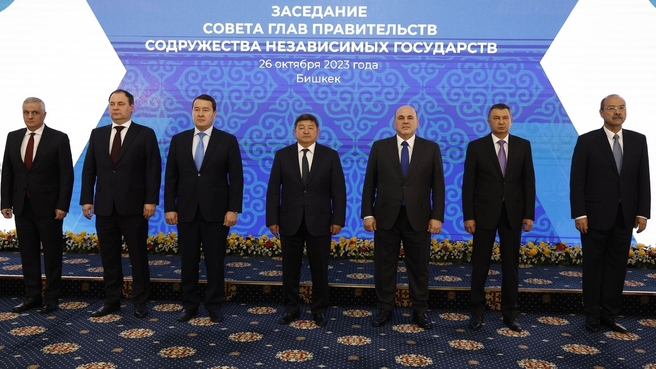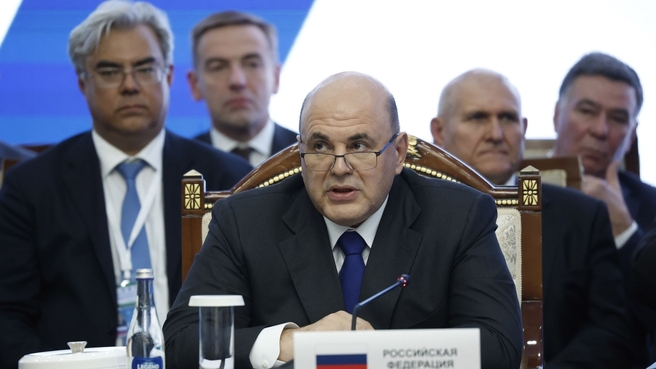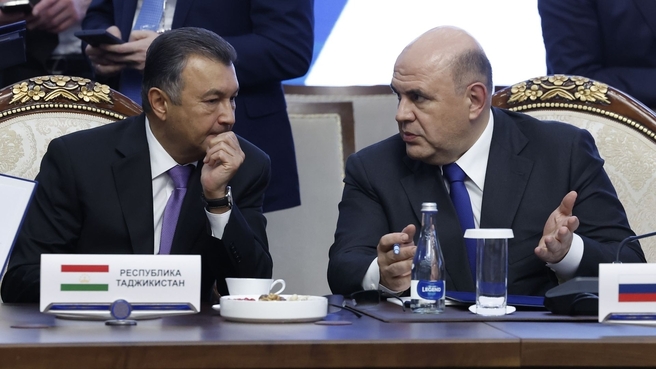Mikhail Mishustin: “We consider it an absolute priority to strengthen ties between the Commonwealth of Independent States and the Eurasian Economic Union. It will increase the region’s resilience to external challenges and unlock the economic, trade and investment potential of our countries.”
Heads of delegations taking part in the meeting of the CIS Council of Heads of Government:
Deputy Prime Minister of the Republic of Azerbaijan Shahin Mustafayev;
Deputy Prime Minister of the Republic of Armenia Mher Grigoryan;
Prime Minister of the Republic of Belarus Roman Golovchenko;
Comment
Prime Minister of the Republic of Kazakhstan Alikhan Smailov;
Chairman of the Cabinet of Ministers and Chief of Staff of the Presidential Executive Office of the Kyrgyz Republic, Chairman of the CIS Council of Heads of Government Akylbek Japarov;
Prime Minister of the Russian Federation Mikhail Mishustin;
Prime Minister of the Republic of Cuba Manuel Marrero Cruz (via videoconference);
Prime Minister of the Republic of Tajikistan Kohir Rasulzoda;
Deputy Prime Minister of Turkmenistan Hojamyrat Geldimyradov;
Prime Minister of the Republic of Uzbekistan Abdulla Aripov;
General Secretary of the CIS Sergei Lebedev;
Chairman of the Board of the Eurasian Economic Commission Mikhail Myasnikovich.
Mikhail Mishustin’s remarks:
Colleagues,
I am glad to welcome all participants in the meeting of the Council of Heads of Government of the Commonwealth of Independent States.
I would like to once again thank Mr Akylbek Japarov and our Kyrgyz colleagues for the excellent organisation of all events.
We have gathered in this extended format to discuss the most important issues related to the development of our common region during a period of profound geopolitical transformations, take a broader look at pressing problems, and exchange experience in cooperation in a variety of areas.
We consider it an absolute priority to strengthen ties between the Commonwealth of Independent States and the Eurasian Economic Union. It will increase the region’s resilience to external challenges and unlock the economic, trade and investment potential of our countries.
This year, Russia presides in the bodies of the Eurasian Economic Union. I would like to thank all the partners for our productive joint work on achieving the priorities identified by President of Russia Vladimir Putin.
These priorities include drafting a new long-term Eurasian integration development plan. The document will serve as a foundation for shaping the image of the union now and into the future, in view of the experience we have accumulated as well as modern trends.
It is important to continue strengthening technological sovereignty and our common industrial base in the key sectors of the economy. Last spring, the leaders of the five countries adopted amendments to the Treaty on the EAEU, establishing a transnational support mechanism for industrial cooperation. Subsidies for such projects should begin as soon as next year.
In our opinion, additional measures are required to expedite the implementation of advanced solutions developed in Russia, with practical steps to coordinate scientific research in priority fields and to commercialise research results.
Creating common energy markets is a significant area of cooperation. Today we are approving rules of mutual energy trading and a document on determining and distributing the capacity of the union members’ energy infrastructure. It is an important step towards strengthening integration in the energy sector.
We should also work on expanding peaceful nuclear energy to achieve the goals of the EAEU’s sustainable development.
The digital agenda opens broad opportunities. It is imperative to launch, as quickly as possible, a shared integrated information system. The infrastructure for a trust-based transborder space and secure communication and data channels is close to completion. By launching them at full capacity, we can ensure uninterrupted interaction between our competent authorities.
Speaking about implementing modern solutions, I would like to note that the benefits of these solutions have already become apparent. Our colleagues said that one example is electronic navigation seals. More than 600 shipments have been completed using these devices in pilot mode. Electronic navigation seals allow for the seamless transit of goods.
Trade will be facilitated by the implementation of the Agreement on the Harmonised System for Determining the Origin of Goods Exported from the Customs Territory of the Union, which was also signed today. Among other things, it establishes single mechanisms for exporters when working with third countries, which will have a positive impact on the foreign economic activity of the EAEU five members with foreign partners.
We will also continue to eliminate restrictions in the domestic market. Eight barriers have been eliminated this year, and 67 barriers have been eliminated over the entire period of the Union’s existence. It is important to prevent the emergence of new barriers to the free movement of goods, services, capital and labour.
Colleagues, despite the turbulence of the global economy, the Eurasian Economic Union is open for mutually beneficial cooperation with all interested countries. Their number is growing. We look forward to signing a full-scale free trade agreement with Iran in the near future. We have made significant progress in the dialogue with Egypt. Negotiations have begun with Indonesia and the United Arab Emirates. We are implementing the roadmap adopted in February to deepen cooperation with China, and we plan to fulfil all the goals I mentioned. I am convinced that this will contribute to the comprehensive development of our common Eurasian region.
Just recently, on 13 October, at the CIS summit here in Bishkek, our heads of state made several very important statements. Among other things, on such topical issues as support for the formation of a multipolar world, promotion of the Russian language, and freedom of religion. I would like to note in this connection the constructive contribution of the Kyrgyz chairmanship in the CIS bodies.
The CIS chairmanship will go to the Russian Federation next year. President Putin noted during a meeting in Bishkek that Russia was committed to strengthening the prestige of the Commonwealth as an integration association and advancing comprehensive cooperation within the CIS based on mutual understanding, trust, equality, and neighbourliness. This primarily includes key tasks aimed at improving the standard of living.
Our organisation boasts strong economic performance numbers. From January to July, industrial output in the CIS grew by over 2.5 percent. Investment in capital assets rose by 8 percent and freight transport by 6.6 percent. Moreover, the CIS GDP grew by 2.2 percent in the first half of the year.
Not long ago, our detractors were predicting an economic collapse for us. Their forecasts failed to materialise.
During our chairmanship, we will continue to focus on deepening integration, particularly in energy, industrial and agricultural cooperation, transport, communication, environmental protection, climate preservation, and scientific, technical, and innovative collaboration, as well as digital transformation.
It is critical to ensure continuity and broader participation in the organisation’s activities, including developing contacts with relevant UN, CSTO and SCO agencies.
We will continue to encourage modern trends across economic sectors and to create a single digital architecture that integrates national electronic services systems which will greatly reduce the complexity of interacting with government agencies and facilitate access to services.
Russia is among the world leaders in this regard, and we are willing to share our experience with every partner.
In the humanitarian sphere, we propose focusing on joint projects in healthcare, science, education, culture, and sports, while maintaining common approaches to prevent attempts to rewrite our shared history.
In October, the leaders made a decision to establish the International Organisation for the Russian Language which brings nations closer and holds special value for each country.
We must do everything within our power to make this entity fully operational. It should be open to all countries that share the importance of treating the Russian language with utmost care.
In addition, I invite all heads of government from the CIS member states to come to a meeting in Moscow in December. We propose dedicating it to discussing prospects for cultural and humanitarian cooperation. This is what unites our peoples. We value our common traditions, history, and culture, and it is important to outline further steps in these important areas. We look forward to seeing all of you.
The timeframe of the event will be coordinated in due course by our relevant agencies.
Colleagues, friends,
Russia remains a reliable ally and trading partner. We pay close attention to the interests of our closest neighbours and friends and expect them to reciprocate. Stronger multilateral ties help improve access to international markets for goods, which benefits our consumers and businesses.
We have decided to showcase the positive outcomes of our country’s cooperation with our CIS partners in various industries at the International Exhibition and Forum titled “Russia” which will take place from 4 November to 12 April at the National Exhibition Centre (VDNKh) in Moscow. I encourage everyone to participate and to organise events in the VDNKh pavilions to demonstrate successful integration projects and new promising initiatives from your, esteemed colleagues, countries.
Friends,
The Commonwealth of Independent States and the Eurasian Economic Union are important mechanisms for maintaining economic stability, fostering a neighbourly atmosphere and promoting friendship among nations.
I’m confident that, in the new geopolitical realities, such close cooperation will be the key to the well-being of the entire region and will contribute to improving the quality of our people’s lives.

















